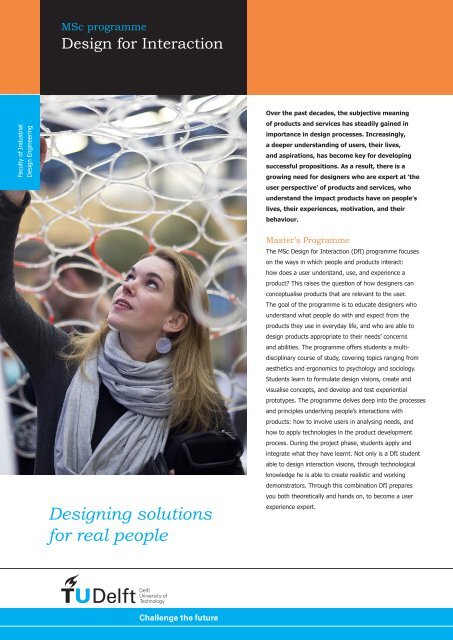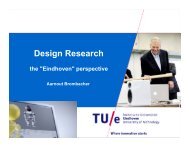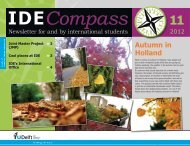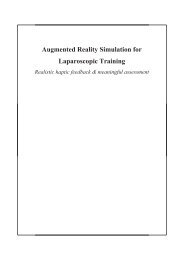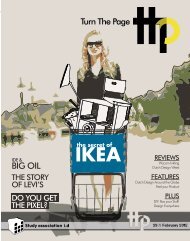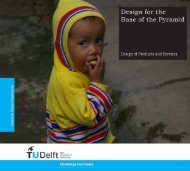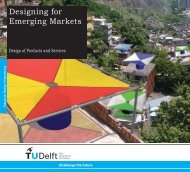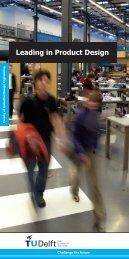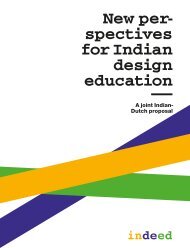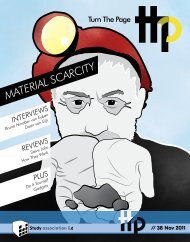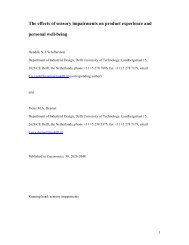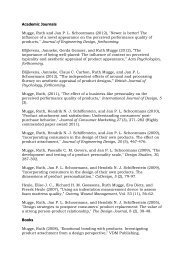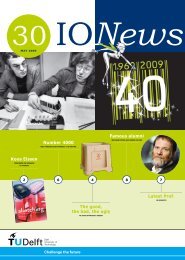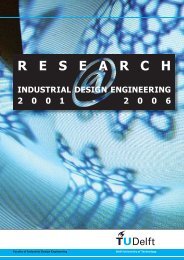Designing solutions for real people - TU Delft
Designing solutions for real people - TU Delft
Designing solutions for real people - TU Delft
You also want an ePaper? Increase the reach of your titles
YUMPU automatically turns print PDFs into web optimized ePapers that Google loves.
MSc programme<br />
Design <strong>for</strong> Interaction<br />
Faculty of Industrial<br />
Design Engineering<br />
Over the past decades, the subjective meaning<br />
of products and services has steadily gained in<br />
importance in design processes. Increasingly,<br />
a deeper understanding of users, their lives,<br />
and aspirations, has become key <strong>for</strong> developing<br />
successful propositions. As a result, there is a<br />
growing need <strong>for</strong> designers who are expert at ‘the<br />
user perspective’ of products and services, who<br />
understand the impact products have on <strong>people</strong>’s<br />
lives, their experiences, motivation, and their<br />
behaviour.<br />
<strong>Designing</strong> <strong>solutions</strong><br />
<strong>for</strong> <strong>real</strong> <strong>people</strong><br />
Master’s Programme<br />
The MSc Design <strong>for</strong> Interaction (DfI) programme focuses<br />
on the ways in which <strong>people</strong> and products interact:<br />
how does a user understand, use, and experience a<br />
product? This raises the question of how designers can<br />
conceptualise products that are relevant to the user.<br />
The goal of the programme is to educate designers who<br />
understand what <strong>people</strong> do with and expect from the<br />
products they use in everyday life, and who are able to<br />
design products appropriate to their needs’ concerns<br />
and abilities. The programme offers students a multidisciplinary<br />
course of study, covering topics ranging from<br />
aesthetics and ergonomics to psychology and sociology.<br />
Students learn to <strong>for</strong>mulate design visions, create and<br />
visualise concepts, and develop and test experiential<br />
prototypes. The programme delves deep into the processes<br />
and principles underlying <strong>people</strong>’s interactions with<br />
products: how to involve users in analysing needs, and<br />
how to apply technologies in the product development<br />
process. During the project phase, students apply and<br />
integrate what they have learnt. Not only is a DfI student<br />
able to design interaction visions, through technological<br />
knowledge he is able to create <strong>real</strong>istic and working<br />
demonstrators. Through this combination DfI prepares<br />
you both theoretically and hands on, to become a user<br />
experience expert.
Shape your master<br />
In all of the Industrial Design Engineering (IDE) masters’<br />
curriculums, 18 EC is reserved <strong>for</strong> elective courses. This<br />
gives students the freedom and responsibility to shape their<br />
own development to match their professional interests and<br />
ambitions. In this way, students can create their own profile.<br />
The elective system has many advantages. Students who want<br />
to broaden their learning can take master’s courses at other<br />
universities, both in the Netherlands and abroad. Furthermore,<br />
they can take courses at other <strong>TU</strong> <strong>Delft</strong> faculties.<br />
For those students who want to increase the depth of their<br />
development as a Design Engineer, IDE offers more than 50<br />
different courses. It is even possible <strong>for</strong> students to sign up <strong>for</strong><br />
courses from one of the other IDE masters’ programmes.<br />
It is also possible <strong>for</strong> students to specialise in Medisign by<br />
spending at least half of their elective ECs (9), a design project<br />
and the graduation project within the Medisign theme.<br />
Curriculum Design <strong>for</strong> Interaction<br />
Candidates begin their studies either in September or in February; the starting date affects the order in which courses are taken. In<br />
either case, in the autumn semester the programme focuses on the generation of concepts and on design evaluation in the spring<br />
semester. During the second year the emphasis is on the students’ design projects and establishing, defining and completing the<br />
individual graduation project.<br />
General IDE Courses<br />
EC<br />
Design Theory and Methodology 3<br />
Generic and Professional Skills 3<br />
Internationalisation 3<br />
Joint Master Project 12<br />
Product Understanding, Use and Experience 6<br />
Context and Conceptualisation 6<br />
Interactive Technology Design 6<br />
Visual Communication Design 3<br />
Reflection on <strong>Designing</strong> 3<br />
DfI Research Methodology 3<br />
Exploring Interactions Project 9<br />
Usability and User eXperience Assessment in Design Project 12<br />
Electives (specialisations can be taken here) 18<br />
Graduation Project 33<br />
EC<br />
Shared IDE courses Projects Master-specific courses Graduation project Electives<br />
• 1 EC = 28 hrs study, according to the European Credit Transfer System (ECTS) • One academic year = 60 EC (1680 hours of study)<br />
• Total amount of credits MSc programme = 120 EC<br />
More in<strong>for</strong>mation on all courses at: www.studyguide.tudelft.nl
Career prospects<br />
The programme prepares graduates <strong>for</strong> positions as product or interaction<br />
designers, R&D specialists, and usability consultants, as well as providing a<br />
solid foundation <strong>for</strong> work in design-centred research. Graduates of the DfI<br />
programme have been hired by leading companies like Philips, Vodafone,<br />
HP, Microsoft, TomTom, Océ, and Unilever, as well as <strong>for</strong> many smaller<br />
firms, and design and market research agencies.<br />
“You can design<br />
without limitations”<br />
I chose DfI because I aspire to be a<br />
user-centred designer. I want to develop my<br />
skills to improve the experiences <strong>people</strong> have<br />
with products. DfI teaches you how to design<br />
meaningful product experiences: researching<br />
and analysing needs and values of users,<br />
conceptualising innovative concepts, and<br />
creating and testing interactive prototypes. As<br />
an interaction designer, I enjoy the ability to<br />
communicate with the various parties involved in<br />
the project to get an overall understanding of the<br />
design challenge at hand. What I love about DfI is<br />
that it starts at the beginning of the design process<br />
where everything is still possible and you can<br />
design without limitations. For me, this creative<br />
freedom is a huge motivation - and then the<br />
process of trans<strong>for</strong>ming these original ideas into<br />
interactive prototypes, well that puts a smile on my<br />
face, every day!<br />
Student Mark Studer<br />
The Netherlands
Admission requirements<br />
and application procedures<br />
Dutch university BSc degree<br />
If you hold a BSc degree of Industrial Design from <strong>TU</strong>D, <strong>TU</strong>/e or UT, you<br />
will be admitted directly into the programme. If the Master programme does<br />
not follow directly on from your undergraduate programme, you will be<br />
required to take additional courses in a so-called bridging programme. To<br />
see which Master programmes are open on completion of your BSc degree<br />
at a Dutch university, go to www.doorstroommatrix.nl<br />
and verify the results with the IDE academic counsellors.<br />
Admission <strong>for</strong> the Master programme and <strong>for</strong> bridging programme must be<br />
granted by the Board of Examiners. Students who are accepted can register<br />
on: www.tudelft.studielink.nl.<br />
If you plan to apply, please consult with the IDE acadamic counsellors first.<br />
The deadline <strong>for</strong> application is 1 July.<br />
Dutch higher education BSc degree<br />
To start a Master programme with a HBO BSc degree, you will first need to<br />
complete and submit the following four checks:<br />
1. Check with the academic counsellors if your BSc degree is related<br />
2. Apply to the IDE Board of Examiners by sending in your full transcript<br />
of records, portfolio and motivation letter.<br />
3. Pass the <strong>TU</strong> admission tests <strong>for</strong> Math and English<br />
4. Complete a 30 ECTS bridging programme. Only possible in the first<br />
semester.<br />
The deadline <strong>for</strong> application is 1 July.<br />
For further in<strong>for</strong>mation<br />
Please visit the website <strong>for</strong> all details,<br />
complete requirements,<br />
deadlines and contact in<strong>for</strong>mation:<br />
www.dfi.msc.tudelft.nl<br />
Further in<strong>for</strong>mation <strong>for</strong> Dutch applicants<br />
ir. J.C. Thieme, ir. C.Veldhuizen or ir. M.W. Biemond,<br />
Academic Counsellors<br />
T +31(0)15 27 82941/87081<br />
E j.c.thieme@tudelft.nl, c.veldhuizen@tudelft.nl or<br />
w.m.biemond@tudelft.nl<br />
Further in<strong>for</strong>mation <strong>for</strong><br />
international applicants<br />
International Office IDE<br />
T +31 (0)15 27 81077<br />
E internationaloffice-io@tudelft.nl<br />
Faculty of Industrial Design Engineering<br />
Landbergstraat 15<br />
2628 CE <strong>Delft</strong><br />
The Netherlands<br />
facebook.com/idetudelft<br />
twitter.com/idestudents<br />
See www.hbodoorstroom.tudelft.nl <strong>for</strong> more details. Application <strong>for</strong> the<br />
programme is granted by the Board of Examiners. If you plan to apply,<br />
please fulfil all the application deadlines and requirements and consult with<br />
the IDE academic counsellors first.<br />
International degree<br />
To be considered <strong>for</strong> admission to a Master programme, applicants with an<br />
international BSc degree must make a <strong>for</strong>mal application <strong>for</strong> admission.<br />
For the starting moment in September the application period starts in<br />
October and closes on 1 April. Please note that your complete application<br />
should reach <strong>TU</strong> <strong>Delft</strong> be<strong>for</strong>e 1 November should you want to apply <strong>for</strong> a<br />
<strong>TU</strong> <strong>Delft</strong> Excellence scholarship.<br />
For the starting moment in February the application period starts in August<br />
and closes on 1 October.<br />
To start an Master application, please complete the online application<br />
and pay the application fee of € 100. Send hard copies of the application<br />
documents to <strong>TU</strong> <strong>Delft</strong>’s International Office and upload your portfolio<br />
digitally. Please visit the webpage <strong>for</strong> admission requirements, deadlines,<br />
application procedures and contact in<strong>for</strong>mation: www.dfi.msc.tudelft.nl


